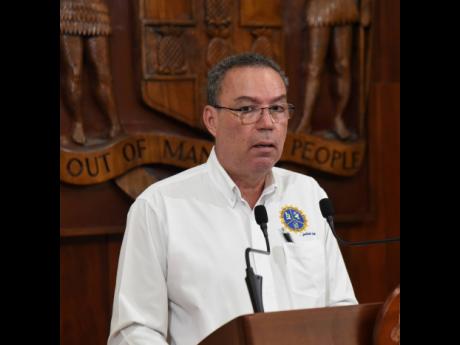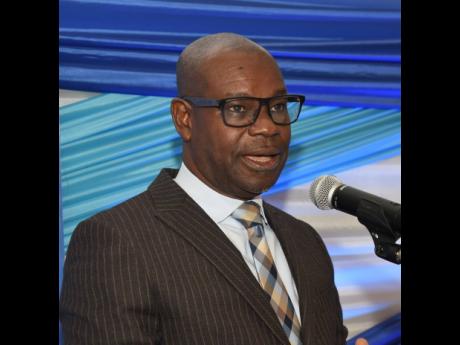‘Better late than never’
Vaz says OUR took too long to address slow pace of JPS’s restoration of power after Hurricane Beryl
Daryl Vaz, minister of science, energy, telecommunications and transport, has chastised the Office of Utilities Regulation (OUR) for being late in holding the Jamaica Public Service (JPS) accountable for the restoration of islandwide electricity following the damage caused by Hurricane Beryl in early July.
While addressing yesterday’s post-Cabinet press briefing at Jamaica House, Vaz said action announced by the OUR on Tuesday had come “better late than never” but went on to outline his concerns about the ongoing situation, which has left some 100,000 persons still without electricity islandwide, especially in rural parishes in the western end of the island.
Vaz stressed a need for the OUR to monitor the maintenance requirements in the JPS’ licence and said that he believed that if it was being monitored properly, then parts of the island would not still be in darkness.
“There is no ‘ifs’, ‘ands’, or ‘buts’ in my own mind that if better maintenance was carried out pre-Beryl, not months before Beryl, I’m speaking about years, that we would not be in the situation that we are in now because we have the evidence that areas that still don’t have light were least affected by the weather event. And when I say least affected, I’m speaking about minimal rain and minimum breeze. Not to mention the squall line [last Friday, of] which winds are less than a tropical depression and what effect that had on customers and the length of time to restore the 10,000 customers,” Vaz said.
“The second thing is the issue of the force majeure. The force majeure, which I have referred to the OUR and referred to the Attorney General’s Chambers, only speaks about what is good for the JPS, and benefits the JPS, and has nothing in relation to the poor, suffering customers of the JPS,” he said.
‘Percentage means nothing to me’
Vaz said he was happy that Ansord Hewitt, director general of the OUR, had singled out the two issues in a post-Cabinet presentation made shortly before the minister’s.
“Those are the issue that concern me, and lastly, the JPS and by virtue the OUR, always speak about the percentage ... . Percentages are not affected by Beryl. Customers are affected! So the percentage means absolutely nothing to me,” Vaz said.
“The only percentage I am interested in is 100 per cent. Anything other than that, don’t tell me about it,” he said.
Vaz explicitly noted there were 25,000 customers that were affected as of last week Friday when he met with the JPS on Friday morning, and up to yesterday, they were down to 21,000.
The post-Cabinet press briefing was being held four weeks to the date that Hurricane Beryl hit the island, a timeframe Vaz said he believed was sufficient to address the outages for the 21,000 households that are still affected and which could equate to more than 100,000 persons.
For his part, Hewitt, in his presentation, said the OUR would be issuing specific directives to the JPS with respect to the remaining timelines for restoration and with which they are expected to be in strict compliance.
“We’re monitoring the restoration of all utilities and doing ad hoc verification and surveillance. Ultimately, as well, there is an audit function for conformity. We have been careful to manage the regulatory reporting burden we impose on the utilities so as to not to impact restoration efforts, which takes priority,” Hewitt said.
He said some of the initiatives announced by the utility companies by way of discounts, bill adjustments, suspension of disconnection, and additional matters have been the direct result of engagement with the local providers.
“I also should note that our examination of reports submitted by JPS and the application of Q factor penalties indicated network issues that required resolution. In discussion, JPS gave clear commitment to resolving them, and indeed, the OUR is aware that this process is in train,” he said.
Hewitt, in a response to a member of the media, said with regard to the Electricity Disaster Fund (EDF), the JPS requested US$7 million at the start of this hurricane season, but only US$4.5 million was approved in May after the OUR assessed the application and given the level of inventory.
The EDF, which is put together through compliant JPS payers substitutes as insurance and was established after Hurricane Gilbert in 1988. There is a provision for JPS to tap into the fund before a disaster to prepare.
The JPS can also ask for an advance from the fund if it has a difficulty funding the restoration process following Hurricane Beryl.
“We haven’t had an ask on that yet so haven’t had any claim from JPS at this point, and the amount in the fund is roughly US$50 million,” Hewitt said.
For Vaz, he said the US$4.5 million “is just a touch under J$700 million that would have been drawn down by the JPS before the hurricane season”.
“So once again, that just strengthens my argument in relation to the fact that they had more than enough resources – financial resources – to be able to plan and execute the recovery of a disaster, which we have had, in a timely manner,” he said.


